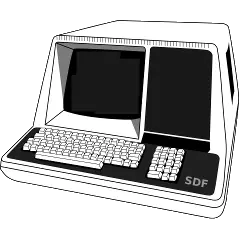It just had to turn it upside down!
jadero
- 3 Posts
- 29 Comments
I think something like the Commodore PET might qualify. Back in the day, I saw it used for everything from cash registers to accountants’ workstations, but rarely for anything else.
I think that the original IBM PC was conceived and marketed as a business machine and only grew beyond that because of Microsoft’s deep commitment to it as a platform and IBM’s uncharacteristicly open specifications and design.
If not for that combination, the PC might never have left the office and most of us would have stuck with the companies who were actually breaking new ground, Apple and Commodore.

 3·9 months ago
3·9 months agoThat doesn’t surprise me. I have Haiku running in a VM, but haven’t looked at it in 2 years, despite the fact I used BeOS as a daily driver back in the day.

 13·10 months ago
13·10 months agoWhenever I price something, I look at the whole package. If I like what a company is doing, I don’t mind paying extra to support them. Sometimes I win, sometimes I lose. With System76, I feel like I won.
They were the only company I found that was offering Canadians any laptop with Linux pre-installed. (I think Lenovo or Toshiba had something, but they weren’t available in Canada.) Having fought mightily with various distros on a wide range of hardware for years, it was critically important that my new daily driver not suck up my time just getting it running and keeping it that way.
Nearly 5 years later, the laptop is still going strong. On top of that, my hopes for their distro have far exceeded any reasonable expectations. I was prepared for the likelihood that I would ultimately need to switch to another distro, but their ongoing development and contributions to the Linux ecosystem have kept me on board and excited for the future.
In the end, I wasn’t buying a laptop. I was buying a system, and I’ve been extremely happy with the outcome.
That said, I suspect my next laptop will be a Framework. Again, it has less to do with the detailed specifics of hardware than in supporting a company in their attempt to do things the way I think they should be done.

 4·1 year ago
4·1 year agoIs that all? I bought my current laptop from System 76 3 or 4 years ago based on my perception that both hardware and Pop were mature enough to be the only computer in the house.
There have been some glitches along the way with the OS, but nothing to get excited about. Notably, I’ve never had to burn things to the ground and start over. :)
There are some ongoing annoyances with the track pad. I don’t know where exactly the problem lies but I do occasionally get cranky :).

When I was looking at 3D printers, my wife asked me if I thought I could make money with it. I said “not in a million years.” She asked me what I was waiting for, then. Two weeks later I was printing the test model! Sadly, I’ve made basically no progress with “real” CAD, so I do everything in TinkerCAD.
Fine woods and metals are crazy expensive, but if you keep your eyes open and aren’t afraid to ask, a lot of pretty nice stuff is available for free or close to it as long as you’re willing to put the time in on reclamation. I just got a nice Schubert chokecherry log for helping take it down and clean up. I got some sheet steel and light duty tubing from some discarded BBQs. And I’ve got more poplar than I know what to do with. Poplar is the go to tree for yards around here and there is hardly a week that goes by without someone taking down an old tree.

my hobby is finding new hobbies
Sounds a bit like me. I just retired in June and am busy setting up my workshop. The original intention was woodworking with a focus on boatbuilding. As I go, I realize that I’m actually headed more in the direction of hobby manufacturing: a variety of stuff in wood and metal with a side order of 3D printing. On top of rebooting my programming hobby of learning a new language every year from before I “sold out” to Visual Basic and Access.

Don’t sweat it. I used to feel the same way. Then, somewhere in my 50s, I realized that I actually had already been doing what I wanted: everything. “Jack of all trades, master of none”.
I did strive toward mastery of most things I tried that I liked enough to stick with for awhile. I like to think that I generally achieved competency, but I know that I had a few bosses and coworkers who would dispute that. :)
Learning new things and having new experiences is priceless. If you can find that within a particular career, that’s fantastic, but it’s not the only approach.

 4·1 year ago
4·1 year agoTo answer the question a bit more directly, I would guess that demographics here skew a bit older than elsewhere. That is just a guess, based on the fact that sdf.org dates back to 1987.

 6·1 year ago
6·1 year agoTwo big ones. I bought the VIC-20 shortly after introduction when I was 21.
Big memory 1: writing machine language programs without the aid of an assembler. I couldn’t afford the assembler cartridge, but I wanted to break out of the BASIC sandbox.
Big memory 2: finding a military surplus acoustic coupler modem and using the schematics to make my own connector, then writing a terminal program so I could dial in to these crazy things called BBSs.
Are you sure that rounding was broken? Many systems use “Gaussian” or “banker’s” rounding to reduce accumulation of rounding errors. Instead of always rounding to the next larger absolute value at .5, they round to the nearest even number. Although it introduces a bias toward even numbers in the result set, it reduces accumulation of error when .5 is as likely as as any other fraction and odd/even are equally likely in the source.
I was taught “banker’s” rounding in school (graduated 1974) and have had to implement it a few times to reduce error accumulation.
If you are looking for a rabbit hole, Wikipedia has a pretty comprehensive article, including an example of how the wrong choice of rounding algorithm led to massive problems at the Vancouver Stock Exchange (Canada).

For anyone not sure what this is all about, CBC has a pretty good podcast covering the descent into medieval nonsense.
I had relatives living just a few miles away in one of the hotspots.

 2·1 year ago
2·1 year agoThanks for the recommendation. I’ve been using Signal since the TextSecure days. In all that time, I’ve been able to move very few people off of whatever came pre-installed.
I looked at Wire when it came out and decided that any gains were not worth the hassle of getting people to move. The fundamentals of switching costs haven’t changed. That is why so many people who rail against Facebook and Twitter still use them.
You’re probably aware of this, but apart from the very real problems associated with centralization on massive services and their desire to create walled gardens, a lot (most?) of the problems you list for email can be traced back to the problems of spam.
Spam makes up the massive bulk of email and most of it is automated and distributed by botnets. Without a lot of the things you list, spam would make email even less useful than it is.
I was once on the front lines of spam management. At the time, I calculated that spam and malware made up 70% - 80% of our company’s incoming email. That was 15 years ago. I can’t imagine things have got better or easier to manage.
And you’re not alone. I know a lot of people who have email only for account management. They monitor their email during registration, add the relevant domain to the allow list, and send everything else to spam. Then they set their spam folder to auto delete anything older than about a month old.
Email is, for all intents and purposes, dead for general purpose communications.

 2·1 year ago
2·1 year agoLol. That’s never going to happen. Most of the people I communicate with can barely wrap their heads around the fact that SMS doesn’t require “WiFi” (their name for internet).
For myself, I’ve looked at some of the other systems, but decided that there’s no point since I’d be alone. :)

 2·1 year ago
2·1 year agoYeah, I think pagers are probably only useful for first responders and the like in remote areas. My pager would work even when our radios wouldn’t, but one way isn’t all that useful for most purposes.

 2·1 year ago
2·1 year agoFor myself, I still use SMS a lot.
The lack of interoperable messengers means that dropping SMS requires installing 3 or 4 different messaging apps, one of which I can’t install because I use Android. So it’s Signal for 3 or 4 people, SMS for everyone else. Quite a few of those “everyone else” people were willing to use Signal as their “everyone else” app, but dropped it when Signal dropped SMS support. It seems people are willing to use a primary app and a secondary app, but not 3 or more.
In my world, SMS won’t go away until someone develops an open protocol that everyone adopts in an interoperable way.

 6·1 year ago
6·1 year agoI recently retired from the local volunteer fire and rescue service. Several years ago the 911 dispatch service wanted to drop paging for notifications and move to SMS. I wrote a nice little technical critique of that plan. In addition to the basic issues regarding coverage (many members have no cell service in their yards, never mind in the fields, yet pagers basically just work), I learned from my technical contacts at the telco that there were a number of service guarantee problems. In addition to the lost and delayed message problem you discovered, things only get worse when crossing providers. As he put it, it’s not so much that it works so good most of the time, it’s that it works at all.
Dispatch did go with SMS notifications, but as an add-on to pagers and “robocalls” to registered phone numbers. We tracked notification channels for several months and found that with every callout, at least one member would report getting the SMS at least 20 minutes later than the page or phone call. Note that most members can get to the hall in 20 minutes or less. A couple of times over the years, we got a flurry of SMS notifications after we were on scene.
Friends don’t let friends use SMS for urgent or critical communications.






Me too, on the VIC-20.